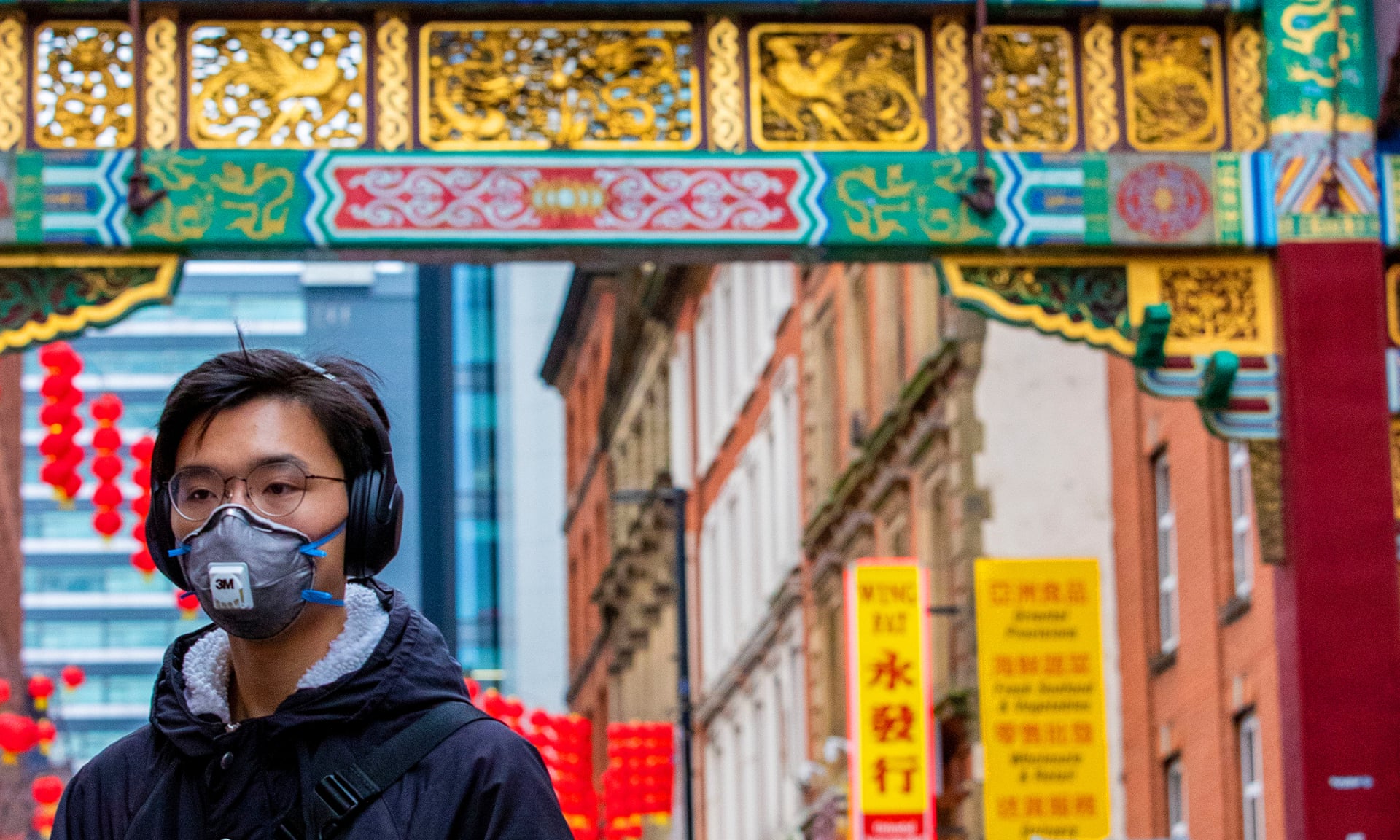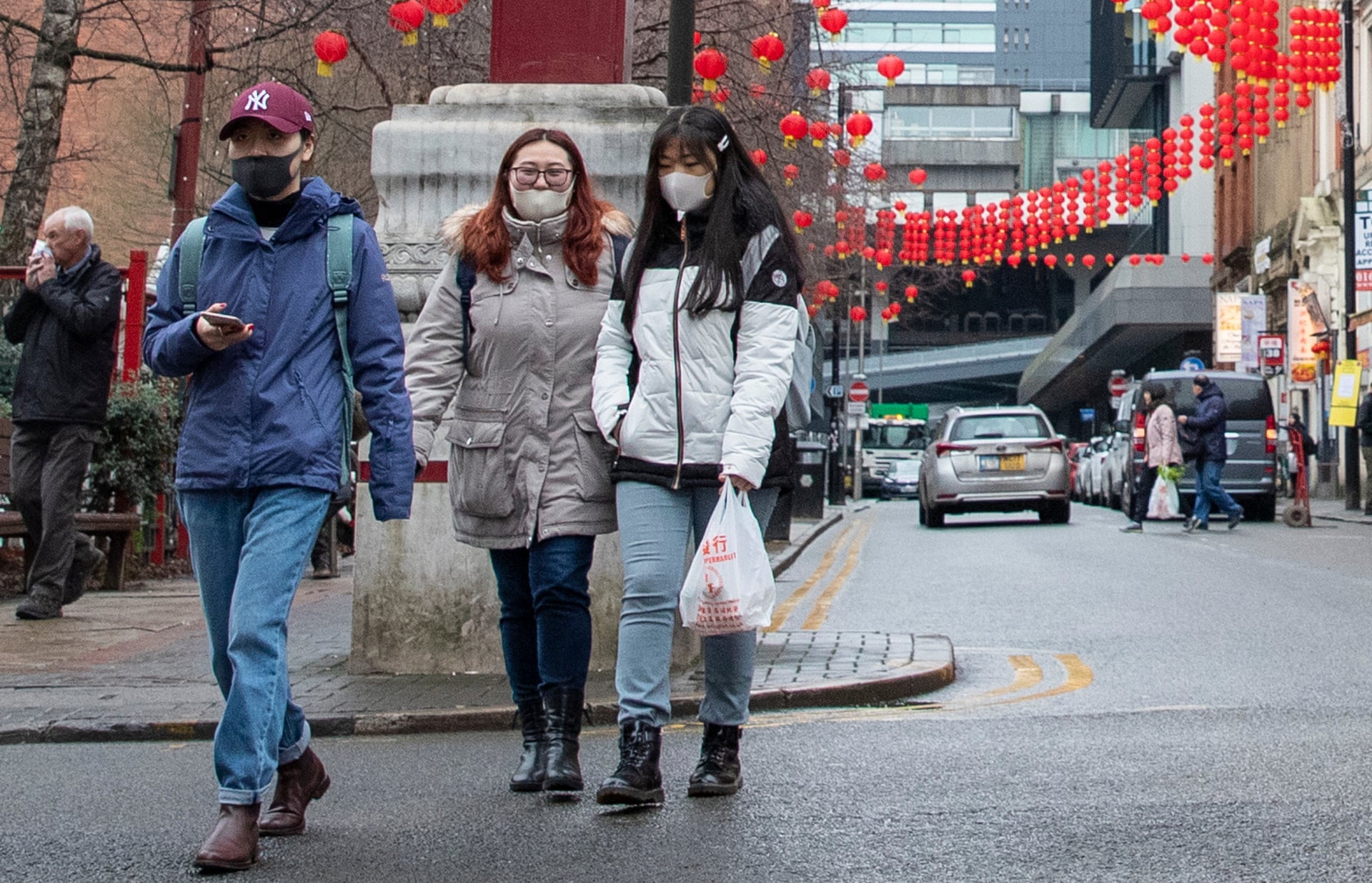By Lucy Campbell

A Chinese in Manchester wearing a face mask.
“We’ll be in trouble if these guys sneeze on us,” Jason Ngan overheard as he and his brother got into a lift in Manchester’s Piccadilly station.
“We’ll be in trouble if these guys sneeze on us,” Jason Ngan overheard as he and his brother got into a lift in Manchester’s Piccadilly station.
Born and bred in Manchester, home to more than 7,000 Chinese, the legal adviser said the level of Sinophobia the Chinese coronavirus had unearthed was shocking.
“People seem to have put a whole race behind it,” Ngan said.
“People seem to have put a whole race behind it,” Ngan said.
Ngan’s mother runs a Chinese restaurant in Heywood, in Rochdale, Greater Manchester.
There had been “a real downturn” over the lunar new year period, particularly since cases were confirmed in York last week, he said.
“It’s been very noticeable, far fewer customers since all this started.”
Despite only four confirmed cases of the coronavirus in the UK, Britain’s 390,000-strong Chinese community have noticed a markedly Sinophobian response to the global health crisis.
In Sheffield, a postgraduate student was reportedly verbally harassed in the street for wearing a face mask, while in Leicestershire two students were pelted with eggs on the street in Market Harborough.
Despite only four confirmed cases of the coronavirus in the UK, Britain’s 390,000-strong Chinese community have noticed a markedly Sinophobian response to the global health crisis.
In Sheffield, a postgraduate student was reportedly verbally harassed in the street for wearing a face mask, while in Leicestershire two students were pelted with eggs on the street in Market Harborough.
The Manchester Chinese Centre has received scores of complaints of incidents targeting children in schools across the region.
North Yorkshire police confirmed they had received two reports of verbal abuse where individuals of a Chinese appearance had comments about Chinese coronavirus shouted at them in York, and there was a further incident where staff at a Chinese tea house had been verbally abused.
Last week the University of York, home to around 2,000 Chinese students, issued a statement calling for respect and tolerance after Sinophobic comments were published on the anonymous confessions page Yorfess.
The site was shut down, but the student newspaper York Vision reported that comments ranged from stating that the risk of the Chinese virus spreading was minimal because Chinese students were “cliquey and unwilling to integrate”, to one user not wanting to share cutlery with their Chinese housemates.
It is relatively common in China to wear a face mask to protect against pollution and sickness, but in the UK some Chinese immigrants say wearing a mask makes them a target for insults.
North Yorkshire police confirmed they had received two reports of verbal abuse where individuals of a Chinese appearance had comments about Chinese coronavirus shouted at them in York, and there was a further incident where staff at a Chinese tea house had been verbally abused.
Last week the University of York, home to around 2,000 Chinese students, issued a statement calling for respect and tolerance after Sinophobic comments were published on the anonymous confessions page Yorfess.
The site was shut down, but the student newspaper York Vision reported that comments ranged from stating that the risk of the Chinese virus spreading was minimal because Chinese students were “cliquey and unwilling to integrate”, to one user not wanting to share cutlery with their Chinese housemates.
It is relatively common in China to wear a face mask to protect against pollution and sickness, but in the UK some Chinese immigrants say wearing a mask makes them a target for insults.

Some Chinese reported feeling uncomfortable wearing face masks as people stared at them.
Jingyi Qian, 24, a student at the University of York, said she felt uncomfortable wearing her mask in public “because people stare at me.”
Hearing about the incident in Sheffield had put her off wearing one.
“I don’t want to get attacked, I just want to protect myself.”
The abuse is not confined to big cities.
The abuse is not confined to big cities.
Waiting for a train in Edale, Derbyshire, Alice, a charity worker, overheard a woman saying she didn’t want a group who appeared to be Chinese to get on the train.
She said the woman’s friend must have tried to reason with her because she then said: “I’m looking out for myself!”
The prejudices exposed by the Chinese coronavirus are symptomatic of a long history of demonising Chinese, according to Jex Wang, a Australo-Chinese DJ and writer, who was sent threatening abuse after writing about the Chinese coronavirus on Instagram.
“Stereotypes of Chinese as submissive and non-aggressive make them a target that people think they can make fun of and laugh at. I’ve seen posts saying Chinese are dirty, disgusting, uneducated, we deserved the Chinese virus because of our weird food habits,” she said.
“I kept seeing memes and jokes being shared which really upset me. There was even a Chinese coronavirus-themed club night in Sheffield that got shut down – they were offering traditional Chinese hats to the first 100 people. What is a traditional Chinese hat?”
After calling out the problematic behaviour and language surrounding the Chinese coronavirus on Instagram, her inbox was soon flooded with such aggressive messages that she had to turn comments off on the post.
The prejudices exposed by the Chinese coronavirus are symptomatic of a long history of demonising Chinese, according to Jex Wang, a Australo-Chinese DJ and writer, who was sent threatening abuse after writing about the Chinese coronavirus on Instagram.
“Stereotypes of Chinese as submissive and non-aggressive make them a target that people think they can make fun of and laugh at. I’ve seen posts saying Chinese are dirty, disgusting, uneducated, we deserved the Chinese virus because of our weird food habits,” she said.
“I kept seeing memes and jokes being shared which really upset me. There was even a Chinese coronavirus-themed club night in Sheffield that got shut down – they were offering traditional Chinese hats to the first 100 people. What is a traditional Chinese hat?”
After calling out the problematic behaviour and language surrounding the Chinese coronavirus on Instagram, her inbox was soon flooded with such aggressive messages that she had to turn comments off on the post.
“People accused me of eating bats, told me to go back to China, I was even accused of fraternising with the Chinese Communist party.”
One message frankly said: "China needs to be cancelled. Period."





